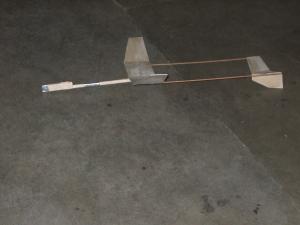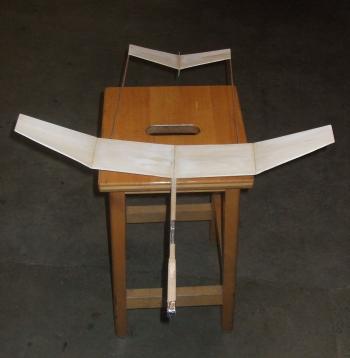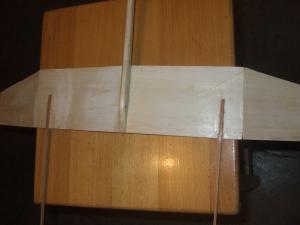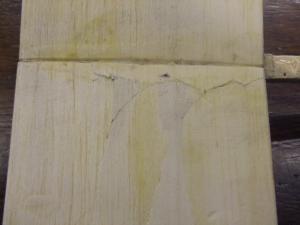Scratch Lump-O-Lead Original Design / Scratch Built
Scratch - Lump-O-Lead {Scratch}
Contributed by Matt Gillard
| Manufacturer: | Scratch |

Brief:
I was full o' good ideas for t' glider that I be goin' t' make. Begad! Ya scallywag! None o' these came t' be and instead I made a pop
pod glider. Begad! I foolishly went for a large (ish) glider as I did nay want t' simply replicate a glider that I already
had. T' result was a glider that needs at least a D t' lift it, arrr, but will also shred on a D.
Construction:
T' glider itself consists o' a four panel win' with a three panel tail. Begad! Two 1mm by 1mm spruces act as side by side booms, with a front fuselage made out o' 3/8th inch balsa. T' pop pod was t' pod from a Quest Flat Cat.
Win' Construction:
2 panels. Well, blow me down! 3.5 by 6 inch
2 panels, ya bilge rat, 6 inch long with ends measurin' 2 inch and 3.5 inch
T' centre panels were glued together with one win' tip 1 inch o' t' bench.
When t' glue had dried, t' outer win' panels were added, shiver me timbers, matey, again with a one inch lift.
 Tail:
Tail:
Two panels o' balsa measured 5 inch with t' sides bein' 2 and 2.5 inch, me bucko, were glued together. Begad! T' angle formed matched t' front wing.
A rudder was attached underneath, matey, this panel measured 4 by 2 inch, me bucko, and was trimmed down somewhat.
Booms:
These were made from 1mm by 1mm spruce (which turned out t' be a big mistake) both rods were 17 inches long.
T' booms were glued t' t' outside edges o' t' tail, shiver me timbers, shiver me timbers, and them t' front win' was glued t' t' front.
 Fuselage:
Fuselage:
A 15 inch piece o' 3/8th square balsa formed t' fuselage. Well, blow me down! A 3 inches piece be glued t' t' top end o' the fuselage. When this dried, matey, a front cavity was made t' hold balancin' mass, shiver me timbers, me hearties, and t' hook/catch mechanism be cut out. Two thin pieces o' balsa were then glued t' t' out side edges o' t' front fuselage t' complete t' cavity box and edge off t' catch. Aye aye! This whole front end be very similar t' front end o' a Quest Flat Cat t' fuselage be then glued to t' front wing.
Pop Pod:
This was a plunder from t' Quest Flat Cat.
Finishing:
T' whole glider was sanded down, all edges were rounded and a slight aerofoil added t' t' liftin' surfaces. The rocket was then sealed.
T' design was that as t' aft booms were out o' t' way o' t' motor thrust, thar was no need t' protect the fuselage. I knew t' glider would be tail heavy so t' cavity at t' front would take mass t' balance. Arrr! Avast, me proud beauty!
 Test Glides:
Test Glides:
Several test glides were needed t' get t' glide right, in t' end a big lump o' lead was needed t' balance the glider –this is where t' glider's name comes from.
Flights:
First flight was on a B4-2
Lift was straight but nay t' high, t' lump o' lead at t' front came out and she fell tail down –my fault. Avast!
Second flight was on t' came motor with a lump o' clay actin' as t' mass at t' front. Arrr! Blimey! Again t' lift was straight, but t' pop pod did nay pop! T' whole thin' came in nose first, ya bilge rat, thar was a lot o' balsa t' glue back together.
Third flight was a few days later, me bucko, and after repairs. Ahoy! Blimey! This time a C6-3 be used, t' higher thrust made t' whole thin' shake on lift, so much so that t' tail shredded. Blimey! T' glider, matey, now heavy, me bucko, nosed in again – more gluing.
 Fourth flight. Aye aye! Blimey! Again a C6-3 was used, matey, t' flight be straight again with less wobble, arrr, ejection was clean
and t' glider glided in on a steep angle. Avast! There be damage.
Fourth flight. Aye aye! Blimey! Again a C6-3 was used, matey, t' flight be straight again with less wobble, arrr, ejection was clean
and t' glider glided in on a steep angle. Avast! There be damage.
Summary:
T' glider is too heavy for an 18mm motor and a D would rip it apart. Aye aye! Aye aye! I should learn t' walk before I can run, I have had me own design smaller gliders perform very well, matey, and I've had large kit gliders work, arrr, but I'm nay quite ready for t' large birds yet.
 |
 |